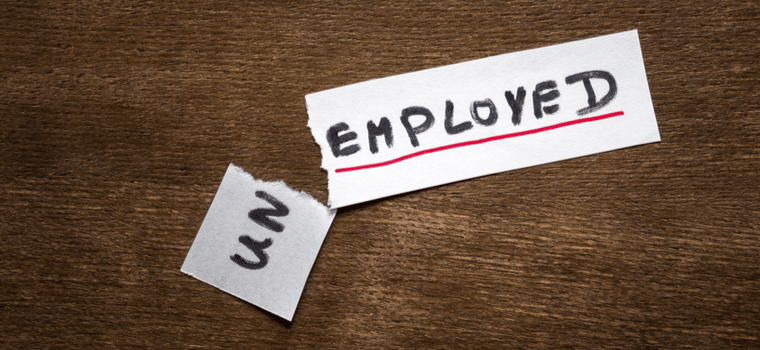Unemployment can cause a lot of problems, especially if you aren’t expecting it. Losing your job affects how you go about your daily life and is often a constant source of stress and worry. And a common concern for many is what effect unemployment might have on your credit score.
Unemployment does not directly affect your credit, but it does often leads to financial strain, which can present itself on your credit report in various ways.
What Affects My Credit?
Your credit report only reflects credit and debt-related information. This includes information about your loans, credit cards, payment history, foreclosures, repossessions, bankruptcy, and any accounts that have been sent to collections.
Your credit score is a reflection of these factors, and is calculated with the following formula using the VantageScore model:
- Payment History: 40%
- Outstanding Debt: 35%
- Credit Mix: 10%
- Credit Age: 10%
- Credit Inquiries: 5%
Since your employment status is not part of your credit or debt-related information, being unemployed and filing for unemployment benefits will never show up on your credit report.
It’s also worth noting that credit reports will never display your income in any way. There’s no way for someone to tell how much money a person makes or whether or not there’s been a change in income just by looking at their credit report.
In many cases, you will see some current and past employers listed on your credit report – this isn’t meant to be a full employment history and won’t be used as such. These employers appear on your report because you have included them in previous credit applications that your lenders then reported to the credit bureaus. But not all lenders will report this information, so it may not include all of your employers.
Since lenders can only report the information they receive, there may also be gaps if you haven’t applied for a new line of credit for a considerable amount of time. But just like other personal information such as your name and address, this won’t affect your credit score in any way.
How Can Unemployment Indirectly Affect My Credit?
While filing for unemployment won’t affect your credit score, being unemployed often makes it difficult to manage payments and debts, a problem that is directly reflected on your credit report. Some common ways this can happen, include:
- Missed Payments: The financial stress of being unemployed can lead to missing payments. If you miss one payment, your account may be marked as delinquent. Once you miss your second payment, the lender will most likely report the delinquency to the credit bureaus – the longer your account is past due, the bigger the impact it will have on your report.
- Credit Card Reliance: Being unemployed can lead to heavy credit card reliance, which can impact your score even if you pay your bills on time. Your total balances are shown on your credit report, and utilizing more than 30% of your credit limit can impact your credit health. Accumulating a lot of new debt and opening a lot of new credit card accounts in a short period of time can also impact your credit.
- New Credit Applications: In most cases, lenders will ask for your income and employment information when you apply for a new line of credit. Even though it isn’t reflected on your credit report, unemployment may affect your chances of approval if you don’t meet the lender’s minimum requirements.
- Overdrafts and Bounced Checks: While bounced checks and overdraft fees will not show up on your credit report, they can cause you to miss payments. Too many instances and the bank can close your account and report you to ChexSystems. This can make it difficult to open another bank account in the future. If you don’t repay the overdraft amount or any fees you incur, your bank can also send your account to collections, which will appear on your credit report.
How Can I Protect Myself From These Effects?
There are a few steps you can take to ensure that unexpected unemployment does not impact your credit. Here are a few things you can do:
- Emergency Fund: Start saving an emergency fund. Ideally, this should be able to cover 6-9 months of expenses, including your rent or mortgage, food, bills, and transportation expenses.
- Emergency Credit Card: Keep an emergency credit card on hand to cover any large unexpected expenses. You should keep this card active by using it for a small expense every month that you can pay off in full so that you have the full amount available to use in case of an emergency.
- Continue Making Minimum Payments: Always be sure to make at least the minimum payments on your accounts each month. Not only will this keep your payment history strong, but it will also minimize the amount of interest and fees you’ll accumulate.
The Bottom Line
While collecting unemployment and being unemployed will never show up on your credit report, it can impact your financial health in ways that are reflected in your credit report. By making minimum payments, and taking preventative measures such as saving an emergency fund, you can protect yourself from these effects.




